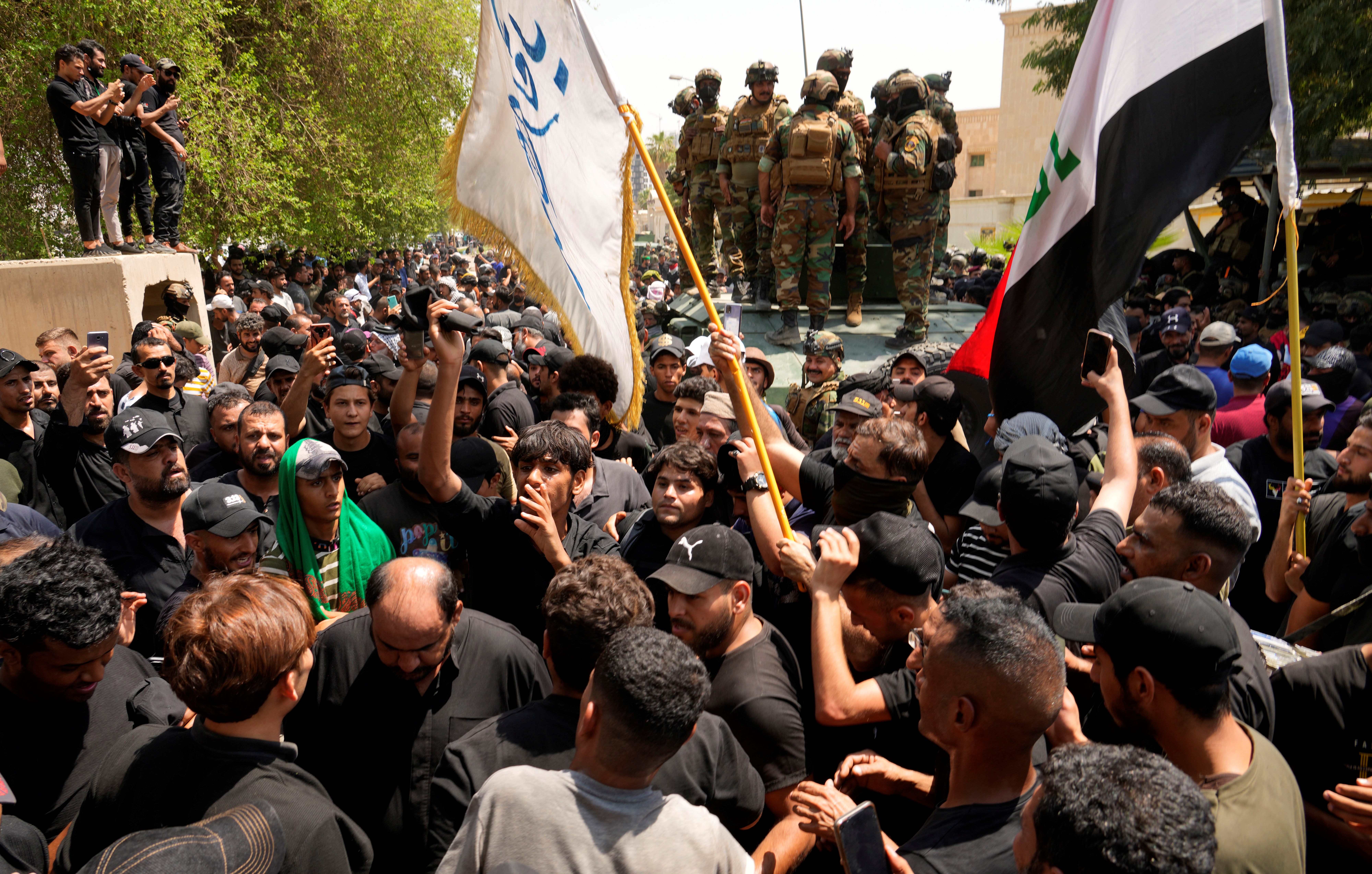Iraq: Al-Sadr calls to withdraw from sit-in, keep tents
After the Sadrist movement's supporters protested in front of the Supreme Judicial Council, the movement's leader, Muqtada Al-Sadr, ask his supporters to withdraw in order to preserve the revolutionaries' reputation.
-

Supporters of Muqtada al-Sadr surround a vehicle with soldiers during a protest in front of the Supreme Judicial Council, in Baghdad, Iraq, Tuesday, Aug. 23, 2022 (AP Photo/Hadi Mizban)
The leader of the Sadrist movement, Muqtada Al-Sadr, demanded Tuesday in a statement his supporters "withdraw from the sit-in square in front of the Iraqi Supreme Judicial Council and keep the tents in its surroundings."
While a statement issued by Al-Sadr's office said that they support the continuation of the sit-in in front of the Supreme Judicial Council to encourage reform and hold the corrupt to account," Al-Sadr advised his supporters to withdraw in order to "preserve the reputation of the revolutionaries and avoid harming the people."
Al-Sadr added, "Let your sit-in in front of Parliament continue if you wish so. The decision belongs to the people."
For his part, Saleh Muhammad Al-Iraqi, who is close to Al-Sadr, said that "Many within the Judiciary want reform and demand to hold the corrupt accountable."
Al-Iraqi added, "I advise withdrawing to preserve the reputation of the revolutionaries and avoid harming the people while keeping the tents under the slogans that the people want to achieve."
Iraqi President Barham Salih underlined earlier today that protesting is protected by the Iraqi constitution. However, he stressed the importance of not hindering the judiciary.
This comes after the country's top judicial council announced that it was suspending its works, the Federal Supreme Court's, and its subsidiary courts'.
Iraqi Prime Minister Mustafa Al-Kadhimi shortcutted a visit to Egypt and returned to Baghdad in light of the chaos in the capital "to directly follow up on the performance of the duties of the security forces in protecting the institutions of the judiciary and the state."
Al-Kadhimi warned that "disrupting the work of the judicial institution exposes the country to real dangers". "The right to demonstrate is protected by the constitution. It is necessary to respect state institutions so that they can continue working in serving the people."
The Coordination Framework in the country wants to set conditions, and it is also demanding a transitional government ahead of fresh polls in the country. But political rival Al-Sadr has been calling for the dissolution of parliament for months in order to pave the way for new elections.
Al-Sadr demanded on August 10 that "the Iraqi judiciary dissolve parliament within a period not exceeding the end of next week," and that "the president of the republic set a date for early parliamentary elections," in light of the political impasse in the country.
Demonstrations called for by the Iraqi Coordination Framework "in support of legitimacy and constitution" started in front of Al-Mu'allaq Bridge in the Iraqi capital, Baghdad.
These sit-ins have been held in parallel with those of the Sadrist movement, with each party having demands of its own.
The main political leaders of Iraq agreed last week to work on a political road map that culminates with a solution to the impasse.
A statement issued by the Prime Minister's office earlier that day said early elections were not ruled out. "Resorting to the ballot box once again through early elections is not an unprecedented event in the history of democracies", the statement added, without explicitly calling for them.
The Coordination Framework in Iraq stressed the importance of expediting the process of naming a presidential candidate and the formation of a service government that addresses the crises in the country.
Earlier in the month, supporters of the Coordination Framework in Iraq flocked to the entrance of the Green Zone to participate in a demonstration raising the slogan of "supporting legitimacy and preserving the constitution," in response to a call by the Framework to the Iraqi people to demonstrate peacefully "to defend their state."
This came after Al-Sadr called on his supporters to demonstrate in favor of their party's demands.

 4 Min Read
4 Min Read








